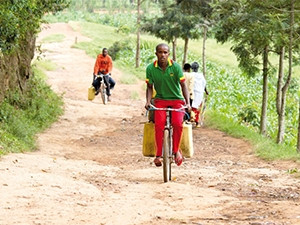
In spite of the relative ease of doing business, infrastructure in Rwanda remains an issue. Road and aviation infrastructure has improved over the last few years, although electricity supply is still poor and expensive. Even though Rwanda maintains connections to three undersea internet cables via Tanzania and Kenya, quality is still low, although the government is trying to address this with its own fibre and 4G rollouts.
"The tech infrastructure is a mixture of high highs and low lows. For the highs, Rwanda has the most affordable internet on the continent and will be the first country in Africa with full-scale deployment of 4G/LTE," Nash says.
"The lows are defined by the fact that Rwanda is a landlocked country that gets its internet from fibre running through Kenya and Tanzania, which has a high cost per MB and limits the total capacity in the country. Anyone who has tried to use a shower when there's no water will understand the issue of first-rate infrastructure that is used under capacity." Skills are an issue as well.
"There is a general shortage of skilled labour, pushing up labour costs in Rwanda when compared to other East African Community countries. As with other African countries, there are also high levels of unemployment and underemployment. Rwanda's growing middle class remains small by comparison," says Hagen.
Nash agrees, calling the local skillset the country's Achilles' heel. "The low number of highly skilled ICT workers is more likely to be working for big multinationals with safe paycheques than being in the trenches of entrepreneurship," he says. Musah too believes Rwanda is still 'very young' in terms of skillset compared to its neighbours.
It's an issue the government is attempting to address, promoting skills development to meet the needs of the private sector through Sector Skills Councils (SSC). A pillar of Vision 2020, the programme aims to create an adequate skills base in Rwanda to meet local, regional and international demands. SSCs operate as autonomous bodies and have responsibility for skills and workforce development.
The government has also partnered with the likes of Microsoft and Intel to launch a number of educational initiatives in schools.
Hagen also highlights the fact that Rwanda is in a malaria zone as something South African companies should be aware of, but says unlike in many other African countries, one thing businesses do not need to fear is corruption.
"Rwanda has tough anti-corruption policies and public sector corruption is limited and perceived to be the lowest among east and central African nations," she says.
For Nash, the country is a 'strange inversion' of other hubs such as Nairobi and Lagos, where there is high corruption and low ease of doing business.
"For Rwanda, corruption has never once been something that SafeMotos has come across and the ease of doing business is unparalleled," he says.
This article was first published in Brainstorm magazine. Click here to read the complete article at the Brainstorm website.
Share